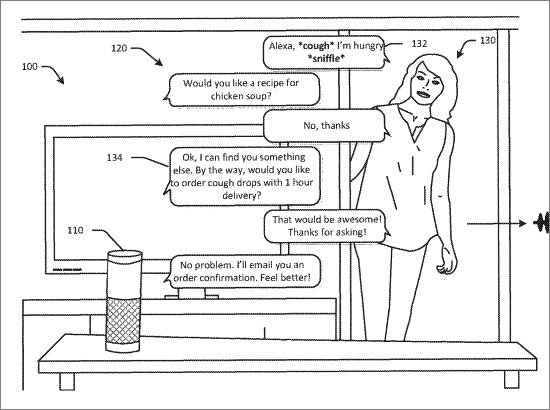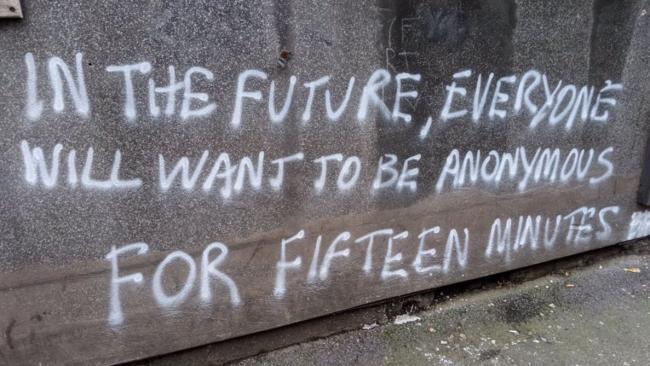Surveillance and the shell game
By Mark Hurst • August 27, 2020
The tech press today began publicizing Amazon's announcement of its new Halo wristband, which captures the user's health data and sends it to their phone for analysis. Amazon claims to track people's physical and mental health, as the device literally listens in on the user's speech in an attempt to diagnose emotional state. This feature inevitably will generate Amazon-certified suggestions for how to improve one's mood. (It's "the digital equivalent of 'smile more,'" as Julie Carpenter pointed out.)
This is not a new idea. Back in 2018, The Next Web reported on an Amazon patent application describing how Alexa might listen in on users' daily lives in order to detect when they have a head cold, then offer to buy appropriate products:

Amazon isn't the only tech giant eager to capture your health data for profit. Sidney Fussell wrote in the Atlantic almost two years ago about Google's patented plans for smart-home devices that will "scan your clothing and listen to you brush your teeth." Which is almost exactly what today's Amazon announcement describes: working with your phone, the Halo scans your body and listens to your daily activities.
The practice of accumulating, analyzing, and monetizing data that used to be considered private: it's the definition of surveillance capitalism, as described in Shoshana Zuboff's 2019 book. It's a well-established business model, even as it continues to develop and metastasize - after all, it took a few years for the patents to take shape and arrive in the market as actual devices, as we see with the Halo. But surveillance capitalism is here, in plain sight, and it's growing.
So it was strange to see a Wired writer and tech-book author post yesterday that "surveillance capitalism" is an "empty catchphrase." Further in the thread, he compares anti-surveillance folks to "anti-vaxxers [and] the stokers of every moral panic in history." All of this in response to Cory Doctorow's newly published book-length post, How to destroy surveillance capitalism.
As an "empty catchphrase," surveillance capitalism sure gets a lot of attention: from a well-researched 525-page book from Zuboff, to the 28,000 words from Doctorow, not to mention the many other books, articles, and podcasts on the subject (including several of my own) in the past year. If the idea is so "empty," why is everyone talking about it?
I think I know what's happening.
A few days ago, the San Francisco Chronicle ran an interview with Peter Schwartz, best known for his previous venture, Global Business Network, which connected tech-booster futurists with well-heeled corporate clients. GBN disappeared along with much of the consulting sector, and now he works as head of strategic planning for Salesforce.
The headline atop the article says it all. "More surveillance is coming. Why that might not be a bad thing." As Schwartz explains,
the honest truth is - for security reasons, for convenience reasons, and now for health reasons - gradually, we will accept much, much greater surveillance. And in the end we won't be too bothered by it because - in fact, for most people in most situations - it will be more beneficial than harmful.
There will be times when it's abused, when data is stolen, when people are harmed by it. But for 99% of the people, 99% of the time, it will mean that you didn't have to show your ticket to get on BART; it means you didn't have to check out at the supermarket; it means that when somebody stole your kid's bike, it will have been seen. Oh, and that unhealthy people will be detected before I get on the airplane.
Here's the man charting the future for Salesforce, a Silicon Valley tech giant - and his message is: Surveillance is inevitable. You might as well get used to it.
Wait, you might be thinking, which is it? If we're concerned about ever-more intrusive surveillance-for-profit in our private lives, are we...
• (according to the Wired writer) so wrong that we're following an "empty catchphrase" into a "moral panic" much like "anti-vaxxers"?
Or are we...
• (according to Salesforce's Peter Schwartz) so incredibly right about growing surveillance that we'll "gradually accept" its unstoppable power and surrender to its inevitable dominance?
These seemingly irreconcilable positions are both coming from Silicon Valley tech elite. What's going on here?
It's a shell game. Whipping around contradictory positions, they're trying to confuse the discussion.
It reminds me a bit of the conversation around climate change. With sufficient financial incentive to maintain the status quo, people say the darnedest things. "Climate change isn't real," we've heard, "just a silly moral panic." And from people with similar incentives: "Climate change is inevitable, you can't stop it, so you might as well get used to it."
My point here is certainly not to propose a climate policy - that's not my expertise - but instead to observe that when something is systemically going wrong, the incumbents will both deny it and declare its inevitability. Either way, the aim is the same: to shut down further exploration, debate, and creativity around solutions.
The fact is that surveillance capitalism does exist, and there are various ways of addressing it. Zuboff and Doctorow (and others) differ in their perspectives, but that's OK: at least we're talking about the key issue. Vigorous debate, respectful disagreement, a diversity of opinions are all important. (Do we need anti-trust? Employee strikes? Bigger fines? Prison time for perjury? Let's talk!)
What we don't need, at all, ever, is people trying to shut down the conversation - which is the aim of simultaneously dismissing, and bowing to, the problem.
A few final pointers.
1. FitBit, which Google is attempting to buy, is also getting further into the health-surveillance racket: Link.
2. Did you take an Ancestry DNA test recently? That just got bought by private-equity giant Blackrock: Link. (Explain to me again how surveillance capitalism doesn't exist, when our very genetic data is for sale? See this thread.)
3. It's not just companies that want you to "smile for the camera" so they can detect your mood - British police are trying it, too: Link.
4. It's not just adults getting surveilled every moment of their existence - college students are now getting a double-dose: Link. (I know, it's pretty much all students these days, but this article shows a particularly egregious case-in-point.)
5. Finally, surveillance isn't just a business-model question. It invades our relationships, our very conception of family. In L.M. Sacasas's latest newsletter (it's excellent, you should subscribe) he quotes Alan Jacobs on surveillance and parenting:
by enforcing surveillance as the normative form of care, the state effectively erases the significance of all other forms of care. Parents might teach their children nothing of value, no moral standards, no self-discipline, no compassion for others - but as long as those children are incessantly observed, then according to the state's standards the parents of those children are good parents. And they are good because they are training their children to accept a lifetime of passive acceptance of surveillance.
Our challenge is to avoid that "passive acceptance of surveillance" - with all the energy we can muster.

Until next time,
- Mark Hurst
Subscribe to my email newsletter
Sign up for my to-do list with privacy built in, Good Todo
Email: mark@creativegood.com
Twitter: @markhurst
Podcast/radio show: techtonic.fm
- - -